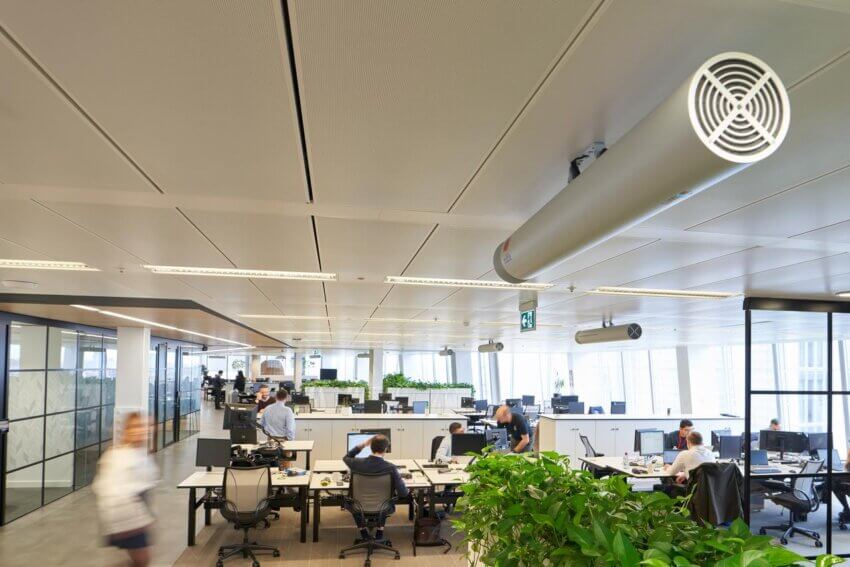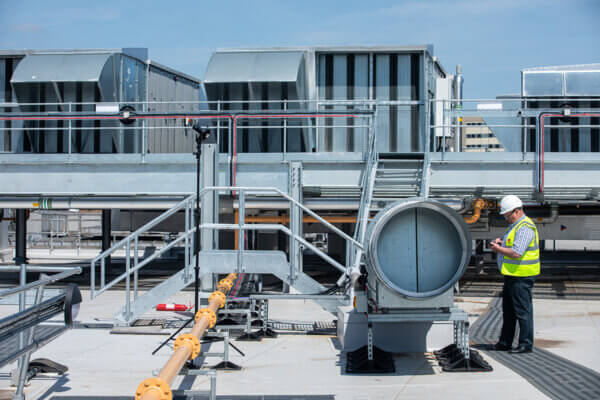Is your organisation ready to clear the air?

When considering the essentials of workplace cleanliness, clean keyboards, loos and kitchen areas are the most obvious priorities.
But what about air cleanliness?
With proposed air purity laws on their way, it’s time for individuals and organisations to sit up and take notice of the air we all breathe.
For this Perspectives article, Mitie’s Head of Building Management Systems: Smart Workplaces, Ben Butterworth, reveals why air quality is becoming a major workplace challenge – and what organisations can do to stay ahead.
Workplace air quality and cleanliness haven’t received the attention they deserve. You can see if your desk is thick with dust and do something about it. Similarly, you can tell if a light is on the blink and an electrician needs to be called. But unless you have an air quality monitor, you can’t tell if the air you’re breathing at work is polluted.
Air quality has a huge influence on our minds and bodies. I’ve seen its impact on my own son, who previously suffered from eczema. We ran HEPA filters throughout our home to remove pollen and other irritants from the air. This helped to reduce the irritation to his skin.

With increasing awareness of its impact, I see air quality as one of the most topical workplace challenges. And I believe there are three good reasons why organisations should pay more attention to the air within their spaces.
Let’s explore each of the reasons in turn…
Legislation could create a legal right to clean air
In the UK, the Clean Air (Human Rights) Bill is going through Parliament. If it passes, it will mean new minimum air quality standards for the workplace.
The Government is also looking to replace EU air quality laws as part of the 2021 Environment Act, which will make organisations responsible for reducing fine, often toxic particulate matter known as PM2.5. These particles can affect our lungs, worsen conditions like asthma and heart disease, and increase the risk of lung cancer.
Bear in mind this all comes in addition to the UK’s commitment to reduce carbon emissions by 68% by 2030. These are both challenging targets, which will require focus from Government and the public and private sectors. The pressure created by these concurrent sustainability goals means it’s hardly ideal timing – but rightly or wrongly, the legislators have the final say. With air pollution officially recognised as the UK’s largest environmental risk to public health, the Government appears determined to act. This means organisations will have to act too.
Clean air makes people more productive
In environments with poor air quality, the build-up of CO2 causes drowsiness, reducing cognitive function and productivity. In a study involving office workers from the UK, USA and elsewhere, the Harvard TH Chan School of Public Health found volunteer response times reduced by up to 1.8% for every 500ppm increase of CO2 in the air. Likewise, the number of correct responses they gave per minute reduced by up to 2.4%. In the simplest terms, the more CO2 we breathe, the less effective we become.
So, fresh air isn’t just more comfortable, but contributes to output and the quality of work. Cleaning up workplace air offers a considerable benefit for those that take appropriate measures. Allowing CO2 to build up ultimately has a negative impact on performance.

Clean air improves health and wellbeing
In a room with a build-up of CO2, there will usually be a corresponding rise in airborne viruses, bacteria, PM2.5 and other nasties. This puts people at a greater risk of becoming ill from an infection or virus. If they do get sick, there will be a decrease in productivity and wellbeing. The NHS includes illnesses caused through poor ventilation in its description of ‘sick building syndrome’. They encourage sufferers to speak to their manager and employer, or even approach their local authority or the Health and Safety Executive if necessary. The consequences of failing to provide clean air could therefore result in external intervention, with reputational damage at the very least.
Time to clean up your act
I’ve shared three compelling reasons why organisations should get ahead and make sure their colleagues are breathing easy:
- Forthcoming legislation giving the right to clean air
- The link between pure air and increased productivity
- Air quality’s impact on general health and wellbeing
Implementing measures to create clean air not only enhances the work environment but contributes to tackling the UK’s biggest environmental risk to public health. Helping people feel good and stay healthy, as well as supporting them to be productive, safeguards their welfare and your reputation.
That’s a win/win for both colleagues and organisations.

Do you agree with Ben? Share your thoughts by emailing [email protected].
Read next

Critical infrastructure, complacency creep and how to avoid it
There have been a few ‘pinch yourself’ moments in my career. One of them came when I descended into an empty water reservoir beneath one of the UK’s busiest transport hubs. It was a…

6 ways to reduce your organisation’s carbon footprint
With over half of the UK’s largest organisations committed to eliminating their carbon emissions by 2050*, there’s growing momentum to reduce our collective carbon footprint. The climate crisis, and the recognised impact of global…
Cleaner air, safer workplaces
The pandemic has brought to the forefront just how important fresh air circulation and a healthy environment is to well-being and performance in the workplace. Good ventilation and the flow of fresh air reduces…
 Skip to content
Skip to content